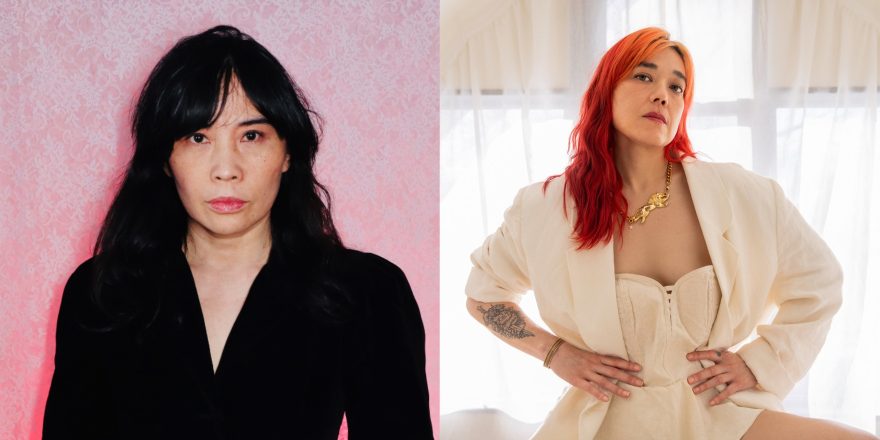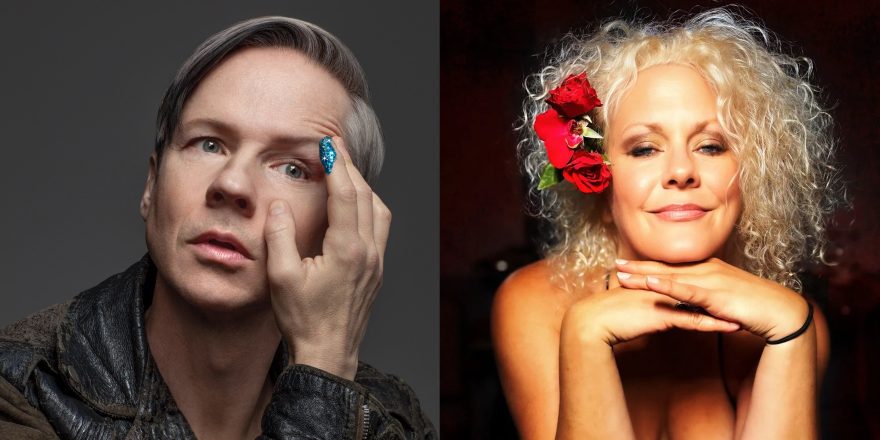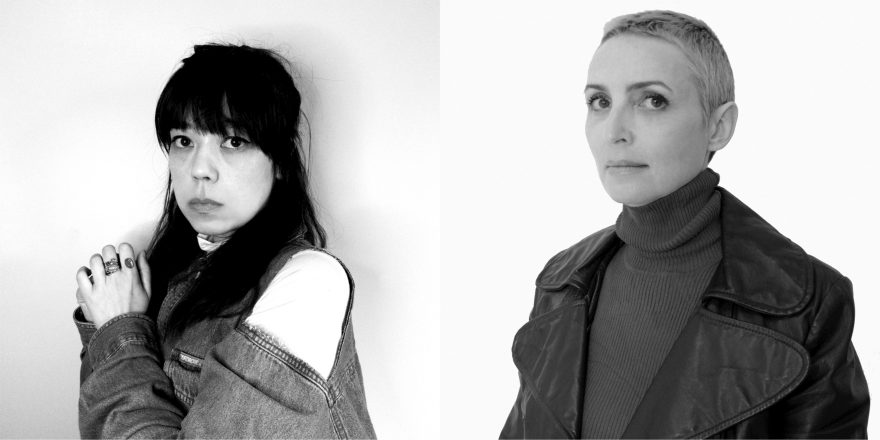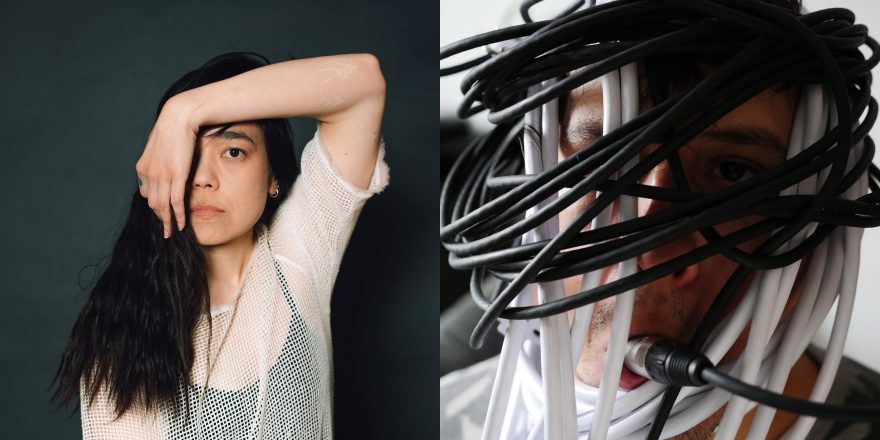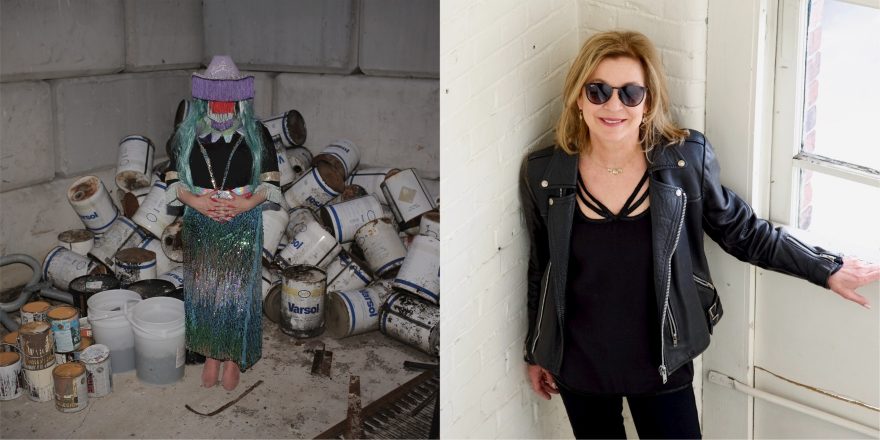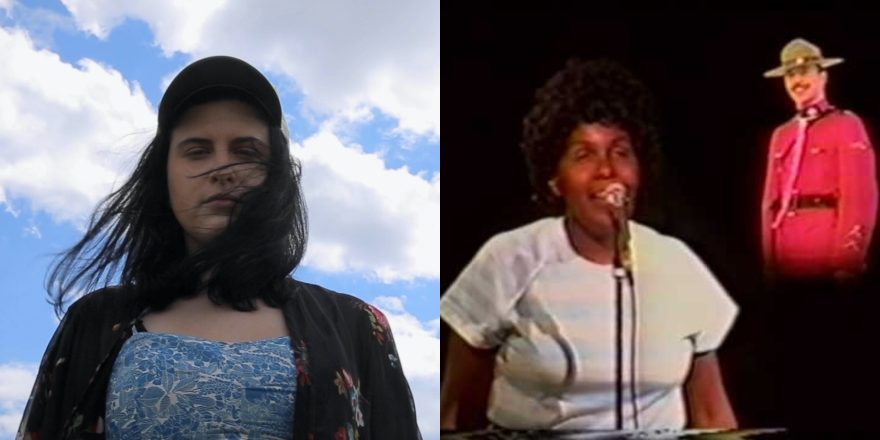Victoria Cheong is a Toronto-based musician and producer who performs as New Chance; Sook-Yin Lee is a filmmaker, musician, actor, and multimedia artist also based in Toronto. New Chance’s A Rock Unsteady was released last month via We Are Time, and Sook-Yin’s latest film Paying For It just came out earlier this year, so to celebrate, the artists got together at Sook-Yin’s place and caught up about it all. You can read their conversation below, and catch New Chance live at the Tranzac Main Hall in Toronto tomorrow, June 14.
— Annie Fell, Editor-in-chief, Talkhouse Music
Victoria Cheong: You’ve been talking a lot.
Sook-Yin Lee: I have been talking a lot.
Victoria: I can tell.
Sook-Yin: [Laughs.] Because I’m like: [coughs].
Victoria: Do you have singers’ stuff that you do?
Sook-Yin: Well, the only thing that I do — because I’m completely untrained in all disciplines — is a long time ago, I played an intersex Mephistopheles for a sort of experimental opera of Faust in Vancouver, and the director gave us all this vocal warm up called the “Ambrosia exercises.” Do you know that one?
Victoria: I don’t think so.
Sook-Yin: It’s the only thing that I can do that helps to loosen up my voice. I’ve tried to do the scales, but this is the only thing that has helped me. You go from your lowest to the highest. It’s like, [vocalizes from her lowest to her highest register].
Victoria: [Laughs.]
Sook-Yin: I remember doing that in clubs and people would be like, “What the fuck is that?” The chef would come down from the kitchen like, “What’s going on? It’s extremely annoying.”
Victoria: Hearing that warm up, I can connect it to having seen you perform and sing in your range.
Sook-Yin: I guess so. I go from low and then high somehow. But sustaining high is very difficult. You do a lot of sustaining high.
Victoria: I’ve started to be able to sustain high. My voice has changed over the years.
Sook-Yin: You have pretty low speaking alto. As a broadcaster on CBC, they always want the low alto. Apparently low is, like, Barbara Frum — you know, [in a low voice,] “Good evening.” It’s different than, [in a high voice,] “Good evening!” A vocal teacher once said to me that my voice is actually naturally pitched higher, but somehow I’ve over-developed the low end. And maybe that’s what happened, because your speaking voice is very low, too.
Victoria: I know. My speaking voice was low even when I was a kid. My doctor would be like, “Is this normal for you?” And I’d be like, “Yes.”
Sook-Yin: [In a low voice,] “Yes, doc.”
Victoria: I’d have an even more raspy voice.
Sook-Yin: I have seen those photos of you with your very no-baloney, furrowed brow. Were you very serious?
Victoria: Oh, yeah. Well, that’s what I’m told. I think serious, but always kind of funny also. Those things go together a lot of the time.
Sook-Yin: True… So, beautiful album, A Rock Unsteady. This is me trying to make a segue professionally.
Victoria: Yeah, you’re good at this. I’ve been interviewed by you once before.
Sook-Yin: Yes, that’s right. For the very wild Unsafe documentary theater performance on censorship and exclusion in Canada. You were great.
Victoria: Well, you were great. I know you as an interviewer, but it was really cool to be in the one-on-one conversation in that way.
Sook-Yin: That was a really fucking wild piece of theater.
Victoria: Yes, it was.
Sook-Yin: I was brought in as a secondary creator to come up with a piece that dealt with censorship of the arts in Canada. And the artistic director at that time was really interested in an occurrence that happened 20 years ago, where a painter had had his paintings taken away and he was charged with all sorts of stuff, and then it was thrown out of court. But as me and my collaborator were thinking of it, we were like, “That doesn’t happen anymore…” So it’s kind of an out of date situation. Nobody really gets put into jail. Touch wood — now we’re in a totally new fascist era where that is happening. But at that point, even five years ago, [censorship] looked like not arresting, but it was about who gets included and who doesn’t get included.
Victoria: That’s what we were talking about, as I recall. And I wonder, has that changed? Yes, I think it has changed, and continues to change.
Sook-Yin: Yeah. What was your main assertion at that point and how is it different today?
Victoria: What I remember was talking about music and genre and the ways that music gets categorized, that may or may not be fair or just or accurate.
Sook-Yin: So being placed in boxes.
Victoria: Yeah.
Sook-Yin: Was it gender boxes or race?
Victoria: I think it was ethnic boxes. And you know what’s funny? I was kind of thinking about this on the way here, because it’s still on my mind as a person that is making work and being public and noticing who notices or how things get contextualized or not. I think artists are sensitive and we are always wondering about who is reflecting us and how we fit in and all that stuff.
Sook-Yin: Yeah, I mean, it changes. Our conversation happened pre-pandemic, and then the pandemic happened and we were all communicating online. And then the emergence of Black Lives Matter and civil fighting, protesting — going to the streets was a radical act, especially during COVID, and a lot of injustices were illuminated during that period. Suddenly I was seeing cultural institutions saying, “We must show the entire visible diversity of all, we have quotients to fill.”
Victoria: [Laughs.] Yeah.
Sook-Yin: There was a lot of moralistic grandstanding and people wanting to look like they were doing the right thing. And now we’re kind of turning the other way, the revoking of DEI and all that stuff. It’s complicated and nuanced and curious.
Victoria: Yeah. I feel like, just personally, I haven’t quite found my way back since the pandemic in terms of my performing life and my art life. And the art making is one thing that’s kind of behind the scenes, but the public artist that I am — I haven’t quite, I guess you could say, recovered. Or, there’s not as much money and there’s not as much happening and the support is kind of shifting. I feel a bit like an outsider. Which is kind of normal for me, most of the time. But now I have a record, so I’m trying to reach people. Basically, I just want it to reach the people that will like it, but that’s tricky. How do you do that? You need support and you need platforms and you need an audience that is desirous or has attention to spare.
Sook-Yin: That’s true. Lives are really full, and there’s a lot of work out there, so how to find your people? I mean, I’ve been making work for many years. I’m completely unemployable in any regard other than making art. I have been very lucky to be able to find jobs like at MuchMusic and CBC that embraced what I had to say as a human. It was never having to fit another kind of identity; they embraced me for what I was, and I was very lucky to have those have had those jobs at a time when there was more money. I was also practically raised by my dad, who always told me to how to maintain my bowel regularity and to save money where I can. He was like, “OK, make sure that you put some money aside. But don’t save all of your money, because the economy needs you to spend money for it to circulate” — very smart person. And I thank my dad and my younger self for having made some savings, because now I’m an artist full-time. And it’s hard, you know? I’m constantly hustling.
Victoria: You are constantly hustling.
Sook-Yin: I am. I’ve spent the last eight months making a movie called Paying For It, which is a live action adaptation of Chester Brown’s graphic novel Paying For It, and it was really a community effort. During the the lockdown, I made two tiny movies on cell phone cameras. The only kind of sane response I could have to this very wild and upturned world was to turn my eyes to making a movie about what was happening. My friend Dylan [Gamble] was reno-victed and we were both going through PTSD for various different things prior to the pandemic, and so when that happened, I was like, “OK, you don’t have a place to live. Why don’t you live here? We’ll make a movie.” It was just on weird little things, and I edited it on iMovie, and somehow CBC Gem were looking for COVID material and they bought this thing. Which actually helped us pay the bills through that time, and I could buy a camera that was better to shoot the second movie. So all of that sort of DIY processes went into this larger movie — which is still a small budget movie, and it was shot entirely in my house and my friends’ houses.
Getting back to your point of how to find your audience, I feel like your work is tender and your process is very delicate.
Victoria: Yeah. It’s very internal.
Sook-Yin: And when I saw you last year — headphones in, doing your stuff. You’re not necessarily, you know, gift-of-gab, “Hey, ladies and gentlemen!”
Victoria: That’s you.
Sook-Yin: Hopefully not me! I don’t want to be that. I’m actually a very introverted and shy person, but if I have art that I believe in, there is no end to the desire to share that with people, and especially in the context of collaboration. I’ve been touring with Paying For It, which was a tiny, handmade movie. Every aspect, from the music to the art to the clothing that we’re wearing — all collaborators within our community, and people that lent me their spaces to shoot in. So a very unusual movie that’s resonated with people that I’m now going back to cities for the third time for runs. I go there in real life to have these Q&As that end up turning out like town halls, because the movie deals with a lot of conflicts around intimacy and vulnerability and lack of labor rights, human rights. There’s only so much you can talk about on social media before you get censored, so going to town to town allows me to really engage in an in-person way. And then also, I document what I’m seeing so as to share that on social media so that Canadians can see how incredible our country is. It’s really a holdover from being a public broadcaster.
I think also, an artist holds responsibility to connect and communicate. So despite being a person that, it’s hard for me just to stand up for myself, when I feel like I’m a leader of an army of amazing people, there will be no end to what I will stand up for.
Victoria: That’s so inspiring. Traveling around with your film, there’s a performative aspect because you’re showing up and having conversations with people or answering questions or just bringing your body with the movie.
Sook-Yin: Yeah. And I’m not getting paid for it.
Victoria: Yeah, I’m sure. It’s cool in the face of the fact that most of the artists that I know are struggling financially. It’s always been precarious, but it’s a bit worse right now, I think, because things are more expensive and there’s more pressure on us. It brings it to this place where it’s like, OK, this isn’t really about money. So what is it about? And it is about something bigger.
Sook-Yin: It’s this whole expression. And there’s many ways to peel this onion. It’s not like everybody has to go through this methodology of moving from town to town. I mean, I very much enjoy it and I’m lucky to be able to. If I can bring a pal — we’re going to Halifax soon, and Dylan Gamble from the band Hot Garbage and I made the score, so we’re going to play some shows there. So when I can bring my teammates with me, it’s such a pleasure, because it just feels like sports.
Victoria: It’s like you’re hanging out.
Sook-Yin: Yeah, it’s totally fun. But at the same time, I have been a touring musician and going back and forth, hitting the same places, singing the same music can be real bore. At first it was really fun, and then after a while, it’s like, “Oh, god…”
Victoria: “I don’t want to hear my own tunes anymore.”
Sook-Yin: Well, sometimes that, but we’re surrounded by beer and it’s at night time and people are smoking. It’s dangerous, and we don’t have a union. It’s a dangerous, perilous adventure. So it comes with a lot of difficulty. And I remember, my first band could fill lots of rooms, but after a while, you find yourself singing and you’re not actually embodying your feeling and your heart and you’re more distracted by something that’s happening at the bar. You go, What the fuck am I doing? So that’s when I turned to making music and not touring. The actual making of the music is a very personal process, and that’s a really beautiful thing. It’s like gardening, taking time to rear and raise this beautiful thing and changing things and inviting friends in. That’s a beautiful process. So to try to tour, it can be challenging.
Victoria: Yeah. I basically have been gearing up to play one release show in Toronto, and then that will give me more information about what feels possible. Because bringing a band on the road, it’s only possible if there’s enough support, and that would require a certain amount of popularity, and there’s only so much I can control in that regard. But I am also kind of self-sufficient and have done so much playing on my own up until now.
Sook-Yin: That’s amazing. That’s huge.
Victoria: Yeah. It’s interesting because when I started to work on this record, I really wanted other people to be involved. I really wanted the singers.
Sook-Yin: And you have them involved. So somehow you managed a very interior, singular process, but you have all these amazing collaborators.
Victoria: It’s true. All the collaborators, they know very little about the interior process, though. They only know whatever they glean from it. I’d say the singers are probably the ones that I worked with the most, but I also organized it so that they could be their own entity, I wrote all their parts, but they’re sort of their own entity that’s responding to me.
Sook-Yin: Well, it sounds like a very directorial process. You have all these elements and your job is to cohesively bring to fruition the album or the song. The mise en scène of audio. And so as a director, all the different people don’t know necessarily what each other is doing, but I see the big picture, and cajole, help — “bring whatever you need, because you’re the only one who knows what you need, and then I know what I need.” And then to orchestrate all those elements, it’s really an amazing thing. I know that you studied film first, so maybe it’s a filmic mindset.
Victoria: Yeah, it totally is. It’s like a world-building, cinematic brain endeavor for me. It’s very imaginal.
Sook-Yin: Yeah, it’s really stunning. It’s quite a departure. You seem to be growing in many ways. It’s very symphonic, very moody… When I listen to it, I feel a tremendous amount of emotion.
Victoria: Yeah. I’m emotional. [Laughs.] It’s hard out here as an emotional person.
Sook-Yin: And yet I was trying to go, What’s the emotion? I couldn’t articulate it with a word. Which is also good. That’s the language of poetry, when it’s so specific that you can’t even say a word to it. It’s a weird, encompassing feeling. And I think you’ve created an album — from front to back, the experience of each song and the totality of them together — that leaves me with some feeling. And that’s amazing.
Victoria: That’s cool. I like the idea that your body would respond.
Sook-Yin: I think that, to me, is the hallmark of what I love in movies and music and art, poetry, dance. The great majority doesn’t leave me feeling anything, but those instances where I feel a movie transforms my biochemistry is very, very special. And same with music and all the forms. There are some times where it just deeply transforms one on a molecular level, which is super cool.
So I think it’s the cliche of “build it and it will come” — I do think there is truth in that. If you make something that is very special, people will find it, and it will find its audience. I think what you have is a very special album that will find its audience.
Victoria: Thank you. The tricky thing about it maybe is that it’s about a feeling, kind of, of not knowing what’s coming next. That’s what it’s about thematically, and that’s the state in which it was created. And also, I’m still totally there in terms of not knowing what’s to come.
Sook-Yin: How does that make you feel?
Victoria: It’s extremely stressful. I’m just now coming around to trying to be more grounded in the present and accept the not knowing. Because there’s no thinking my way to knowing or forcing it. But all the songs were written during the pandemic, so it’s also sort of a COVID creation. So, yeah, the kind of precarity of the moment and the not knowing and, I guess, just the desire to participate in my own changing, and trying to figure out how to do that. And you can do that artistically.
Sook-Yin: Well, here’s the thing: what you’re talking about is universal, fundamental, existential anxiety of not knowing where things are going. And yet that’s what we are in every moment. We don’t know what’s going to happen next. That’s just reality. But I think that our understanding of the world is precipitated by our tool, and that is our body, our filter.
I think that the way in which the human and animal kingdom operate is as wanting-to-know machines. Much of it is planned to figure out what’s next. Even visually, we fill in the blanks. There’s something that pushes us to try to plan ahead and foresee and gamble on what is to come in order to protect us so that we don’t die. Every day, we’re making minute decisions that are about the certainty of where we’ll be in order that we don’t die. So what you’re battling is essentially your body.
Victoria: Yeah.
Sook-Yin: And there’s only so much that we can do about that. But it reminds me of a great song — there was the wonderful band called Nomeansno when I was growing up. They were from Victoria and I loved them so much. From their album Sex Mad, they have a song called “Metronome,” and the lyrics are, “Keep it steady, keep it steady, keep it steady… I want to break the things that seek to control, I want to live my life with no rules at all, I want to smash the lips that smile down on me, I want to rip and tear until I am free…” And the one thing that I really love is he says, “You know, the one thing I think that attracts people to a steady beat, is the certainty of where it will be, in the next moment, its inevitability, with no variation. The comfort and security of knowing what and who you are, you hear that beat, it’s beating on you, it’s beating on me.” So they upturn that. They reveal that wanting that is like hanging on.
Victoria: Yeah. Or there’s an oppressive force at play, also.
Sook-Yin: And it’s conformity. And it’s beating on us so that we want to be steady. Which is why we have habits and why we do things exactly the same and why we go to work every day. The sort of order in repetition is part of us that makes us feel safe, but it beats us through life.
Victoria: Right. If we’re only married to that and we’re not allowed to have the uncertain periods or the existential questions… I mean, for me, I do feel like I’m in an exceptional uncertainty in this particular moment.
Sook-Yin: Well, if it’s financial precarity as well, that’s freaking terrifying.
Victoria: Yeah, exactly. But also, I’ve always been artistically interested in these kinds of philosophical questions. That’s where I turn to making things, to kind of express my findings.
Sook-Yin: That difficult moment inspired your album. And maybe that’s the feeling that I’m getting — because it’s beautiful, but it’s also a little bit unnerving.
Victoria: There’s a lot of kind of mining of pain. And it’s also, I think, pretty romantic. It’s a little bit of a torturous romantic pain thing, which I think a lot of people can relate to in different ways. Some people really turn away from stuff like that, but for me, I always want to use that material. I find that to be fertile ground creatively.
But it’s funny, on my way here, I was trying to refresh my mind about the record, and I was like, It kind of exists in a very underground space… Like, underground as in private, but even kind of like a dungeon. There’s some holding space that I feel like the record occupies, and it’s sort of dark.
Sook-Yin: For sure. I’m reminded of Joni Mitchell saying that she sings her sorrows and paints her joys, and different mediums require different things. I do find with the stuff that I like, my ear tends toward the minor keys. I’m not really a pump-it-up party person for music. I mean, I do like party songs, but usually they also have a minor feeling to them. And what you’ve created is also, despite its unnerving or difficult qualities, a pleasure to listen to. And especially at this point in time, I feel that’s so important to make work that is also pleasurable.
Victoria: Well, the line between pleasure and pain is very wavy.
Sook-Yin: Yeah. I think that this point in time is a really dynamic time to be alive. There is both progress and regress exploding in a very challenging situation for the planet, for everyone in the world. And so I think, as it becomes harder to make a living as an artist, it’s going to really push us to step forward and do it for the reasons that weren’t necessarily financial, because we all will eventually die and we might as well go down making the stuff that we believe in. So it’s really important that you continue to make work. And I hear your struggle. And I’m happy for your struggle.
Victoria: Yeah. It’s a good struggle. We have to just continue to also be ourselves — which is weirdly revolutionary.
Sook-Yin: I mean, I’ve been on the planet for long enough to know that most of my friends were themselves. And my friend John Cameron Mitchell, who I’ve made two movies with, young people now are like, “John, will you please teach us how to be the punk?”
Victoria: [Laughs.]
Sook-Yin: I think there’s a lot of conformity right now, in very unusual ways. But people just want to be free. And so if we can be free and ourselves in all of our difficulty…
Victoria: We should exercise that.
Sook-Yin: Do it.
(Photo Credit: right, Claire Harvie)



